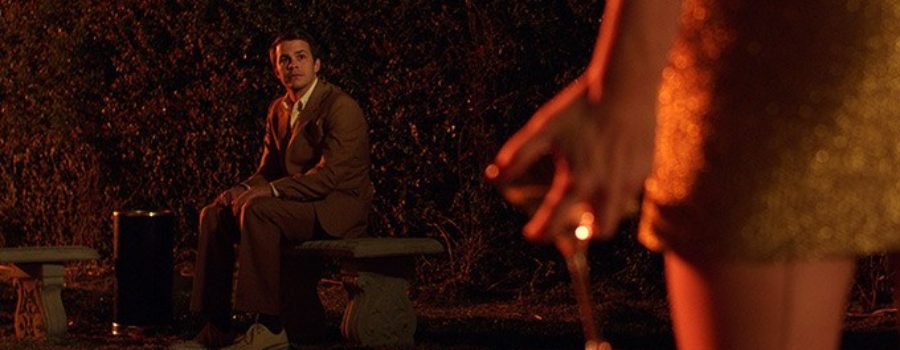 [Published at Awards Circuit] Any film lover is lying if they say they are not equal parts astounded by, jealous of, and forever indebted to the Coppola family for their exponential, endless talent and contributions to the medium of cinema. The Coppola empire, in the context of film, spans far and wide. Recent additions to the family in the form of awakening creative talents are Gia Coppola (“Palo Alto,” for which Robert Schwartzman composed the score), Francis Ford Coppola’s granddaughter, and, now, Robert Schwartzman, making his writing and directorial debut with “Dreamland.” If that is not convincing enough of their unceasing grasp in the industry, many people often forget that Oscar winner Nicolas Cage was born Nicolas Kim Coppola, cousin of Sofia Coppola, son of Francis Ford Coppola’s brother, film preservationist August Coppola, and grandson of film composer Carmine Coppola.
[Published at Awards Circuit] Any film lover is lying if they say they are not equal parts astounded by, jealous of, and forever indebted to the Coppola family for their exponential, endless talent and contributions to the medium of cinema. The Coppola empire, in the context of film, spans far and wide. Recent additions to the family in the form of awakening creative talents are Gia Coppola (“Palo Alto,” for which Robert Schwartzman composed the score), Francis Ford Coppola’s granddaughter, and, now, Robert Schwartzman, making his writing and directorial debut with “Dreamland.” If that is not convincing enough of their unceasing grasp in the industry, many people often forget that Oscar winner Nicolas Cage was born Nicolas Kim Coppola, cousin of Sofia Coppola, son of Francis Ford Coppola’s brother, film preservationist August Coppola, and grandson of film composer Carmine Coppola.
So, who is Robert Schwartzman? Everybody knows who multiple Oscar winner, founder of Modern American Cinema, and Bay Area legend Francis Ford Coppola (writer, director and producer of “The Godfather” trilogy) and Oscar winner Sofia Coppola (“Lost in Translation,“ “The Virgin Suicides“) are. The father-daughter duo are, arguably, the most talented creative forces in film since John and Anjelica Huston. People may not know that actress Talia Shire (“Rocky” pentalogy, “The Godfather” trilogy), is Francis Ford Coppola’s sister, and that she has two children, Jason and Robert Schwartzman. Jason Schwartzman is an established actor and frequent collaborator with Wes Anderson, who often co-writes with Roman Coppola, son of Francis Ford and cousin to Sofia. That leaves Robert, though a member of indie rock band Rooney, with nothing significant on his film resume until now.
Mr. Schwartzman gets his chance to permanently embed his voice in the annals of cinema with “Dreamland,” and he adds a fairly distinctive, promising one, echoing in its vast archives eternally. The film follows a pianist named Monty, played with careful nuance by rising star Johnny Simmons (“The Perks of Being a Wallflower“), who has a passionate affair with an older, married woman named Olivia (Amy Landecker) that upends his life. It is shot with a careful and detailed eye; Schwartzman seems to have inherited the dominant perfectionist gene often scene in the Coppola family. His dialogue is, for the most part, natural, and provides his actors a burgeoning platform to fully exercise their talents. One can notice a fixation with light and focus throughout the film, and Schwartzman uses this to his advantage to create a surreal, reverie-like atmosphere.
After his girlfriend (Frankie Shaw) cheats on him, and after the whirlwind affair that brings him out of his shell and awakens him sexually and emotionally, he comes out a confident man with an expanded perspective on life. This film is a solid coming-of-age story that acknowledges its predecessors like “The Graduate,” even almost shot-for-shot recreating Mike Nichols’ famous pool scene with Dustin Hoffman at one point, and adds something new to the well-weathered “pushing-the-boundaries-of-society’s-confines-of-love” genre.
Regarding the topic of reinventing genres, the “coming-of-age” genre used to be characterized by children, typically portrayed as 12 to 18 years of age. However, over the decades, as Generation Xers and Millennials began making films, coming-of-age films portrayed people growing up far later in life, reflecting both a social trend of kids being dependent on their parents far longer than during previous generations, and a staggering difference in the cost of living that significantly stunts many millennials’ abilities to evolve and flourish. Monty’s character is in his mid-to-late twenties, and is just now going through the changes that many characters of coming-of-age stories over the past four decades underwent years earlier in their lives. It is considerably ironic that some of the youth of today lose their innocence so much earlier than those of previous generations through excessive exposure, yet they tend to grow up a lot later in their youth, even into adulthood, a theme which both big studio and independent films alike have begun to touch upon.
There are brief echoes of Sofia, an example of which is displayed in the way the piano scenes and musical numbers are humorously shot to contrast the shaky emotional arc of Monty, and Gia, examples of which can be seen in the last sequence at the vow renewal ceremony that leads up to Monty’s encounter with the receptionist, which channels the cinematography of “Palo Alto’s” party scenes, and, naturally, the film’s score. Overall, references to all things Coppola can be seen throughout the film in the form of Coppola wine bottles and Sofia’s characteristically pink champagne, as well as shots that emulate Sofia Coppola’s “Somewhere” during Monty’s hotel stay. These references, along with his references such as “The Graduate’s” pool scene, are Schwartzman’s way of giving a nod to his elders and mentors in the industry; it is his way of paying homage to both family members and unrelated predecessors who blazed revolutionary paths in the medium of film before him.
One can expect an exceptional secondary cast in the aforementioned Landecker, Shaw and Schwartzman, along with Alan Ruck (“Ferris Bueller’s Day Off”), Beverly D’Angelo (“Vacation” trilogy), and a welcome cameo from none other than Talia Shire herself, who, fittingly, portrays Monty’s mother.
Similarly to “La La Land,“ the theme of jazz preservation is prevalent. The musical numbers, on top of Robert Schwartzman’s adept utilization of comedy, give emotional weight to the movie. Music plays an important role in this film. Along with the previously established “forbidden affair” and “coming-of-age” dramas, “Dreamland” is very much considered, at the very least, a sub-genre of the musical. With Monty being a pianist, and Schwartzman having mostly musical department, song and composer credits in his filmography before “Dreamland,” one can make an educated guess that Monty is a variation of Robert, especially with the casting choice of his own mother, Talia, as Monty’s mother. Schwartzman uses the musical numbers, score and songs to flow well with his camerawork, and displays a promising knack for tinkering with music to influence the audience’s elicited emotional response to his advantage. If he keeps making films and evolving his storytelling and filmmaking abilities, he might just catch up with his relatives. Viewers can look forward to seeing Schwartzman’s follow-up to the auspicious “Dreamland.”
“Dreamland” was distributed by Orion Pictures and was released Nov. 11, 2016.
GRADE: (★★★)








Leave a Reply
Your email is safe with us.